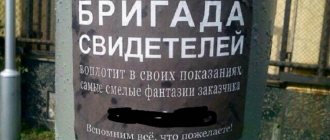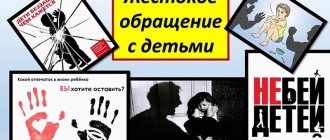Judicial practice under Article 307 of the Criminal Code of the Russian Federation
Resolution of the ECHR dated March 28, 2017
83. Article 281 of the Civil Code of the Russian Federation requires that compensation for seizure correspond to the market value of the property. The Government submitted that the City Court had been presented with a valuation report calculated by a private company, estimating the value of the applicant's and the applicant's properties at US$24,488 and US$73,463 respectively. In addition, the city court requested an expert opinion regarding the market value of the property. The applicants agreed that this determination would be made by the same private company. The experts were warned of criminal liability for drawing up a knowingly false expert opinion (Article 307 of the Criminal Code of the Russian Federation). The new report assessed the value of the applicants' property at $28,500 and $85,600, respectively. The applicants then missed the opportunity to obtain further expert assessment and failed to provide evidence to support their argument that their property was of higher value.
Appeal ruling of the Judicial Collegium for Criminal Cases of the Supreme Court of the Russian Federation dated 07/05/2018 N 4-APU18-25
Taking into account the procedural status of Sh. as a person in respect of whom the case was separated into separate proceedings in connection with the conclusion of a pre-trial agreement, the court correctly did not warn him of criminal liability under Art. Art. 307, 308 of the Criminal Code of the Russian Federation and explained the provisions of Art. Criminal Code of the Russian Federation.
Appeal ruling of the Judicial Collegium for Criminal Cases of the Supreme Court of the Russian Federation dated July 26, 2018 N 47-APU18-7
The arguments of the complaints about the groundlessness of the court's reference to the testimony of witnesses E. and S. are untenable, since the witnesses gave their testimony after they were warned of criminal liability under Art. 307 of the Criminal Code of the Russian Federation, the court did not establish any grounds for E. and S. to slander the convicted persons, and such reasons were not indicated in the appeals of the convicted persons.
Determination of the Judicial Collegium for Criminal Cases of the Supreme Court of the Russian Federation dated August 28, 2018 N 72-UD18-11
By the verdict of the Chita City Court of the Trans-Baikal Territory, which entered into legal force on May 8, 2021, D. was convicted under Part 2 of Article 307 of the Criminal Code of the Russian Federation for giving knowingly false testimony during the investigation and in court, connected with the accusation against Danchenko E.S. in the commission of a particularly serious crime (criminal case No. 1-524/2018, vol. 2, pp. 223 - 224).
Appeal ruling of the Judicial Collegium for Criminal Cases of the Supreme Court of the Russian Federation dated 02/09/2018 N 1-APU17-12
During the identification process (vol. 3, pp. 123 - 124), she was not warned of liability under Art. Art. 307 and 308 of the Criminal Code of the Russian Federation. Interrogated in the witness box, witness B., witness K., and extra L. confirmed the contents of the protocol, which does not contain any indication of her warning of liability. At the same time, B. noted a significant difference between the identifiable Shkaev and the extras. At the same time, despite these violations, the court recognized this protocol as admissible, trying to justify this with judgments that directly contradict the requirements of Art. Art. 193, 166 and 167 of the Code of Criminal Procedure of the Russian Federation, allowing for the possibility of a one-time warning of a witness about liability for giving knowingly false testimony for the entire period of the proceedings.
Appeal ruling of the Judicial Collegium for Military Personnel Cases of the Supreme Court of the Russian Federation dated 08/09/2018 N 205-APU18-18
The interrogations of the named persons were carried out by the investigator in compliance with the requirements of Art. Art. 164 and 189 of the Code of Criminal Procedure of the Russian Federation. The investigator verified the identity of the witnesses, explained their rights, and warned them about the responsibility provided for in Art. Art. 307 and 308 of the Criminal Code of the Russian Federation, as well as the procedure for conducting investigative actions. Interrogation of witnesses G. and M. in the absence of lawyers, requirements of Part 5 of Art. 189 of the Code of Criminal Procedure of the Russian Federation does not contradict. In accordance with this provision of the law, the lawyer is present during the interrogation of the witness and enjoys the rights provided for in Part 2 of Art. 53 of the Code of Criminal Procedure of the Russian Federation, if the witness came for questioning with a lawyer invited by him to provide legal assistance.
Appeal ruling of the Judicial Collegium for Criminal Cases of the Supreme Court of the Russian Federation dated 06.08.2018 N 72-APU18-9sp
Interrogated witnesses and victims were warned about criminal liability under Art. Art. 307, 308 of the Criminal Code of the Russian Federation. Subscriptions regarding this were taken from witnesses at the place of their interrogations, including through videoconferencing; these signatures are available in the case materials. The parties were not deprived of the opportunity to ask the interrogated witnesses questions of interest to them, taking into account the peculiarities of the judicial investigation with the participation of a jury.
Appeal ruling of the Judicial Collegium for Criminal Cases of the Supreme Court of the Russian Federation dated September 26, 2018 N 7-APU18-3sp
In addition, experts, having been warned of criminal liability under Art. 307 of the Criminal Code of the Russian Federation, based on the results of an examination of the convicted person, they came to a unanimous opinion, while the act complies with the requirements of Art. 204 of the Code of Criminal Procedure of the Russian Federation. Therefore, there is no reason not to trust the conclusions contained in the said act.
Appeal ruling of the Judicial Collegium for Criminal Cases of the Supreme Court of the Russian Federation dated November 27, 2018 N 56-APU18-21
Contrary to the arguments of the appeals in the verdict, the court in accordance with Art. 307 of the Criminal Code of the Russian Federation gave reasons for accepting some evidence and rejecting others. Ovchinnikov's testimony was rightfully critically assessed by the court of first instance as contradicting the body of evidence. Assessing Simaev's testimony at the trial, the court came to the reasonable conclusion that by changing his previously given testimony, he tried to significantly reduce the degree of his guilt and pursued the goal of helping Ovchinnikov avoid responsibility for what he had done.
Resolution of the Presidium of the Supreme Court of the Russian Federation dated December 5, 2018 N 207P18
July 5, 2012 to Govorov A.V. charged under paragraph “a” of Part 3 of Art. 286, paragraphs “a”, “c”, part 2 of Art. 158, paragraphs “b”, “d”, part 3 of Art. 228.1 of the Criminal Code of the Russian Federation (as amended by Federal Law No. 215-FZ of July 27, 2009), paragraphs “a”, “c”, part 3 of Art. 286, part 3 art. 303, part 2 art. 307, part 6 art. 290 of the Criminal Code of the Russian Federation (as amended by Federal Law No. 97-FZ of May 4, 2011), paragraphs “a”, “b”, “d”, part 3 of Art. 228.1 of the Criminal Code of the Russian Federation (as amended by Federal Law No. 87-FZ of May 19, 2010), clauses “a”, “b”, “c”, part 3 of Art. 286, part 3 art. 303, paragraphs “b”, “d”, part 3 of Art. 228.1 of the Criminal Code of the Russian Federation (as amended by Federal Law No. 87-FZ of May 19, 2010), clause “c”, part 3 of Art. 286, part 3 art. 303, paragraph “a”, part 3, art. 286, paragraphs “a”, “d”, part 2 of Art. 161, part 4 art. 159 of the Criminal Code of the Russian Federation (as amended by Federal Law of December 8, 2003 N 162-FZ), paragraphs “a”, “b”, “d”, part 3 of Art. 228.1 of the Criminal Code of the Russian Federation (as amended by Federal Law No. 87-FZ of May 19, 2010), clause “c”, part 3 of Art. 286, paragraph “a”, part 3, art. 158, paragraphs “b”, “d”, part 3 of Art. 228.1 of the Criminal Code of the Russian Federation (as amended by Federal Law No. 87-FZ of May 19, 2010), Part 3 of Art. 175 of the Criminal Code of the Russian Federation (as amended by Federal Law No. 26-FZ of March 7, 2011).
Determination of the Constitutional Court of the Russian Federation dated January 29, 2019 N 31-O
As noted by the Constitutional Court of the Russian Federation in Resolution No. 17-P of July 20, 2021, a person who is accused (including convicted) in a separate criminal case cannot, when the court is considering the main criminal case in which another person is accused (his accomplice), are given the procedural status of an accused (defendant) in the main case, and therefore cannot participate in it as an accused and give evidence in this case according to the rules of interrogation of the defendant. The mere extension of the rules for interrogating a witness to the procedure for giving evidence by a person whose criminal case has been separated into separate proceedings in a court hearing in the main criminal case does not turn him - in the system of current legal regulation - into a witness in the proper sense of the word (as relating to other , in addition to the prosecution and defense, participants in criminal proceedings), since such a person is simultaneously accused in a separate criminal case of committing a crime for which his possible accomplices are accused within the framework of the main criminal case. Consequently, such a person, when interrogated in proceedings in the main criminal case against another person with whom he is accused of committing one act, is not a proper subject of crimes provided for in Articles 307 and 308 of the Criminal Code of the Russian Federation; Accordingly, the possibility of bringing him to criminal liability on the basis of these articles is not assumed, and therefore there is no need to warn about it during his interrogation in the proceedings in the main criminal case.
Examples from judicial practice
Example one: Gr. B. during the investigation of a theft from an apartment, trying to create an alibi for his friend, Mr. D., assured the investigation that this citizen was fishing with him. During further investigation, it turned out that Mr. B. gave deliberately false testimony. For this he was prosecuted under Art. 307, part 1, with a fine of 20 thousand rubles.
Example two: Citizen P., being in a deeply hostile relationship with her neighbor in the stairwell, gr. R. accused him of pushing her at the entrance to the entrance; she fell and broke her arm. During the investigation, thanks to a security camera installed at the entrance, it was established that gr. P. fell without assistance, slipping on the ice. The court accused the citizen of giving false testimony and brought her to justice under Art. 307, part 1 with payment of a fine in the amount of 80 thousand rubles.
Any questions you may have can be asked in the comments to the article.
Legal liability for libel: review of legislation – 2021
1. “Slander”: how it happened.
The criminal article “Slander” has a long and controversial history. An article with this name existed in the original version of the Criminal Code of the Russian Federation under number 129. In that version, it provided for liability under three elements: libel itself, public libel and libel with an accusation of a serious or especially serious crime. According to the first part, the accused was threatened with a fine, compulsory or correctional labor; according to the second - the same punishments or arrest for up to six months; according to the third - restriction of freedom, arrest or imprisonment for up to three years.
At the end of 2011, libel was decriminalized and transferred to the category of administrative offenses. But, as they say, the music did not play for long. Less than a year has passed since the article was returned to the Criminal Code. This happened at the end of July 2012. Today the article is listed as number 128.1. Given the fresh memory of decriminalization, at first it did not provide for punishment in the form of imprisonment or even arrest.
Everything changed when, at the end of 2021, the president signed the Federal Law “On Amendments to Article 128.1 of the Criminal Code of the Russian Federation.”
Read about how exactly everything has changed in our material.
And further. In December last year, the term “slander” was added to the Code of Administrative Offenses of the Russian Federation. By the way, both in criminal law and in the legislation on administrative offenses, libel is understood as the dissemination of knowingly false information that discredits the honor and dignity of another person or undermines his reputation. The only difference is that in criminal proceedings citizens, that is, individuals, are held accountable, and in administrative proceedings - legal entities. This is understandable: you cannot put a legal entity in prison.
2. Liability for libel in 2021: what's new?
So, the article about slander has come a long way and entered a new turn of the historical spiral. Initially, it was a criminal offense, which provided for imprisonment for up to three years, then administrative, then again a crime, but with punishment without imprisonment. And now, as at the very beginning, the article again provides for punishment in the form of imprisonment, only for up to five years.
As it is said in the famous “Chernomyrdinka”: “This has never happened before, and here it is again.”
Indeed, with the entry into force of Federal Law No. 538-FZ of December 30, 2021 “On Amendments to Article 128.1 of the Criminal Code of the Russian Federation,” criminal liability for libel has been tightened.
Today, for defamation contained in a public speech, a publicly displayed work, the media, or - attention - committed publicly using information and telecommunication networks, including the Internet, or against several persons, including those not individually identified, a fine is imposed in the amount of up to one million rubles or in the amount of wages or other income of the convicted person for a period of up to one year, or compulsory labor for a period of up to two hundred and forty hours, or forced labor for a period of up to two years, or arrest for a period of up to two months, or deprivation freedom for up to two years. The variety of punishment options is impressive!
Further. For slander using one's official position, one can pay with a fine of up to two million rubles or in the amount of wages or other income for a period of up to two years, or by compulsory labor for a period of up to three hundred and twenty hours, or by forced labor for a period of up to three years, or by arrest. for a term of up to four months, or imprisonment for a term of up to three years.
If a person is slandered that he suffers from a disease dangerous to others, a fine of up to three million rubles or in the amount of wages or other income for a period of up to three years, or in the form of compulsory labor for a period of up to four hundred hours, or forced labor for a period of up to four years, or arrest for a term of up to six months, or imprisonment for a term of up to four years.
Finally, you will have to suffer the worst for false accusations of sexual harassment, that is, for accusations of committing a crime against sexual integrity and sexual freedom of the individual or another serious or especially serious crime. Here it’s already up to five years in prison. Other types of punishment increase proportionally.
With regard to the administrative liability provided for legal entities by Article 5.61.1. Code of Administrative Offenses of the Russian Federation, then they face a fine of five hundred thousand to three million rubles for libel. And nothing more.
3. The evolution of slander and its effects.
When in the summer of 2012, libel from an offense again became a crime (meaning, the adoption of Federal Law No. 141-FZ of July 28, 2012 “On Amendments to the Criminal Code of the Russian Federation and Certain Legislative Acts of the Russian Federation”), this was explained by the author of the legislative initiative parliamentarian Pavel Krasheninnikov, that the decriminalization of libel “did not give the desired result, but rather the opposite.” But with the return of slander to the Criminal Code, there is less “public garbage”.
Experts who analyzed the practice of criminal cases after 2012 noted that Article 128.1 is perhaps the only one in the Criminal Code under which the number of acquittals significantly exceeded the number of convictions. For example, in 2013, 107 were convicted and 520 were acquitted; in 2014 - 141 people and 663 people, respectively.
There is a certain signature of the times in the fact that the current norm on libel lives in the Criminal Code precisely in the wording provided for in Article 128.1. And, of course, it is too early to talk about law enforcement practice, since not even six months have passed since the new edition came into force, although the notorious handwriting of time gives its own clues as to how it will develop.
But at the same time, today there are proposals from the liberal public to transfer both slander and insult to the rank of administrative offenses. It seems that if this happens, it will not be soon. On the Internet there was an opinion: “A society in which the main law is the Criminal Code is abnormal... That is, in our country all legal relations are considered through the prism of the Criminal Code. When the main code is the Civil Code, we will live in a different society.”
Wait and see.
Victoria Burla
For
April 27, 2021
What to do to prevent coercion to testify?
To protect yourself from possible violence from law enforcement officers, be sure to enlist the support of a lawyer when you are arrested. If a detained citizen does not have a lawyer’s number, he can call his relatives and ask them to find a lawyer: the right to a telephone call within the first three hours is enshrined in Article 14 of the Federal Law “On the Police”. A lawyer will immediately arrive at the address you provide. Practice shows that law enforcement officers do not risk putting pressure on a detainee while giving explanations in the presence of a defense lawyer.
Before the lawyer arrives:
- When detained by the police, do not use violence against law enforcement officers. Firstly, in this case, the actions of the detainee can be brought under Article 318 of the Criminal Code of the Russian Federation, and secondly, the police will be able to explain the resulting injuries by the fact that the citizen resisted or attacked law enforcement officers.
- Politely explain to the police that you will not give any explanations until the lawyer arrives. It is not recommended to communicate with law enforcement officers even on abstract topics - experienced investigators will be able to obtain the necessary information without the citizen noticing.
- Do not sign any documents. It has been proven that a person in a stressful situation is not able to fully understand the meaning and meaning of what is written.








